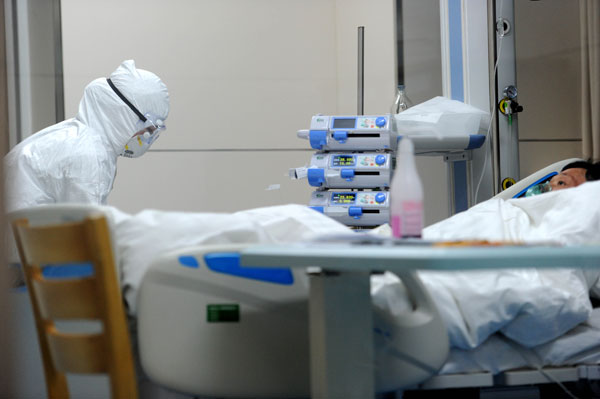Boy's flu recovery shows benefit of early detection
Updated: 2013-04-09 23:45
By Shan Juan (China Daily)
|
||||||||
Public health experts are working closely with doctors to detect early and mild H7N9 cases at hospitals, said Feng Zijian, director of the health emergency center of the Chinese Center for Disease Control and Prevention.
Feng made the comment after the recent recovery of a 4-year-old Shanghai boy from H7N9, the first known patient with a mild infection.
 |
|
A medical worker tends a patient infected with H7N9 flu in an intensive care unit at a hospital in Bozhou, Anhui province, on Monday. LIU JUNXI / XINHUA |
"That showed that mild cases of H7N9 infection also exist, and early treatment can be effective in reversing the process of the illness," he told China Daily on Tuesday.
Authorities confirmed four new human infections of H7N9 avian flu, including two in Shanghai and two in Zhejiang province, on Tuesday, bringing the total number of cases to 28.
A man confirmed to have contracted the virus died on Tuesday in Jiangsu province, bringing the death toll from the flu to eight in the country, authorities said.
Feng said it generally takes three to four days after infection for serious symptoms to develop.
"If we can detect early-stage cases, with mild symptoms, anti-virus medication would help to reverse the process," he said.
Feng suggested expanding H7N9 screening to include patients with mild symptoms.
Under the current guidelines distributed by the health authority, only patients who have had contact with live poultry who develop pneumonia or serious flu symptoms, including high fever, are tested for H7N9.
The Shanghai boy, unlike most other H7N9 patients, "was not hospitalized because of high fever and a runny nose", said Yu Hui, director of the infectious disease department of the Children's Hospital affiliated with Fudan University, where the boy is being treated.
As a flu epidemic surveillance site, the hospital quickly sent samples from the boy to Shanghai Center for Disease Control and Prevention for H7N9 screening, and that ensured early detection, she said.
"Upon receiving the diagnosis, we put him on Tamiflu immediately, and that led to his quick recovery," she said.
The boy now has no respiratory symptoms or fever, but he will remain in the hospital for observation, Xinhua reported.
The standards for discharging H7N9-infected patients have not yet been determined.
H1N1-infected patients must have a full recovery period of seven days and two negative virus tests before they can be discharged from the hospital.
However, Ma Anlin, deputy director of the department of infectious diseases at the China-Japan Friendship Hospital in Beijing, thought it was too soon to expand H7N9 screening.
In regard to the Shanghai boy, he said, "A single case is not enough to serve as the basis of an entire intervention strategy, and practical constraints in equipment and human resources don't permit universal H7N9 screening for all flu patients.
"The top priority in clinical work is treating severe cases to prevent deaths," he said.
It's not feasible or cost-effective to test patients with mild flu for H7N9 infection, he said.
Moreover, "to simply expand virus testing might cause panic and unnecessarily increase the workload of healthcare workers and public health professionals", he said.
"We strictly adhere to the guidelines for H7N9 tests, and so far our hospital has not tested anybody for the virus," he said.
- Science academy kicks off H7N9 research
- 4 suspected H7N9 patients test negative
- E China reports 4 new H7N9 cases
- HK CE pledges resources to fight H7N9
- No H7N9 epidemic among poultry: expert
- Pingtan beefs up H7N9 prevention efforts
- Shared fight against H7N9
- Bird flu fears see stocks hit lowest level in 2013
- Bird flu can be contained, say national officials
- Jitters hit market as bird flu fears spread
- Bird flu fears see stocks hit lowest level in 2013
- Bird flu clouds some industries in China

 Li Na on Time cover, makes influential 100 list
Li Na on Time cover, makes influential 100 list
 FBI releases photos of 2 Boston bombings suspects
FBI releases photos of 2 Boston bombings suspects
 World's wackiest hairstyles
World's wackiest hairstyles
 Sandstorms strike Northwest China
Sandstorms strike Northwest China
 Never-seen photos of Madonna on display
Never-seen photos of Madonna on display
 H7N9 outbreak linked to waterfowl migration
H7N9 outbreak linked to waterfowl migration
 Dozens feared dead in Texas plant blast
Dozens feared dead in Texas plant blast
 Venezuelan court rules out manual votes counting
Venezuelan court rules out manual votes counting
Most Viewed
Editor's Picks

|

|

|

|

|

|
Today's Top News
Boston bombing suspect reported cornered on boat
7.0-magnitude quake hits Sichuan
Cross-talk artist helps to spread the word
'Green' awareness levels drop in Beijing
Palace Museum spruces up
First couple on Time's list of most influential
H7N9 flu transmission studied
Trading channels 'need to broaden'
US Weekly

|

|







